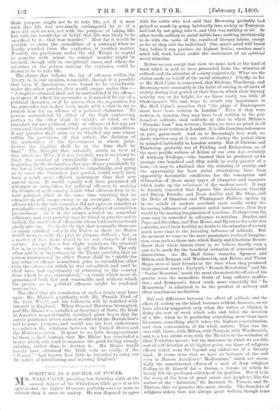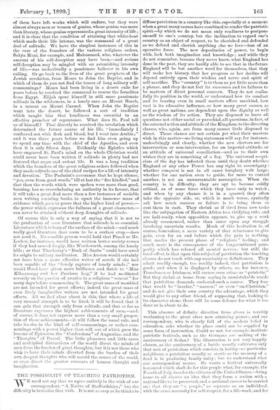SOLITUDE AS A SOURCE OF POWER.
MR. RILL CAINE, presiding last Saturday night at the annual dinner of the Whitefriars Club, gave it as his opinion that the higher literature probably owes no more to solitude than it owes to society. He was disposed to agree
with the critic who had said that Browning probably had gained as much by going habitually into society as Tennyson had lost by not going into it, and that was nothing at all. In other words, solitary or social habits have nothing intrinsically to do with the value of the results of literary labour, except so far as they suit the individual. One man's mind will brood long before it can produce its highest fruits ; another man's mind will work better under the excitement of an aabitual social stimulus.
Before we can accept that view, we must look at the kind of work which is said to have proceeded from the stimulus of solitude and the stimulus of society respectively. What are the claims made on behalf of the social stimulus ? Chiefly, so far as Mr. Hall Caine is concerned, that Dickens, Thackeray, and Browning were constantly in the habit of mixing in all sorts of society during that period of their lives in which their literary activity was at its height, for we know vastly too little of Shakespeare's life and ways to attach any importance to Mr. Hall Caine's assertion that "the plays of Shakespeare must have been written in London." Even if they were written in London, they may have been written in the pro- foundest solitude, such solitude as that in which Milton's "Paradise Lost" was written ; besides, we have no proof at all that they were written in London. It is idle founding inferences on pure guess-work. And as to Browning's best work, we doubt whether any of it was written during the period when he mingled habitually in London society. But of Dickens and Thackeray, probably too of Fielding and Richardson, as of the most prolific writers of fiction of our own day, certainly of Anthony Trollope,—who boasted that he produced on bm average two hundred and fifty words to every quarter of a hour,—it may be admitted that the stimulus of society, and the opportunity for keen social observation, have been apparently favourable conditions for the conception and delineation of those many types of character and manners which make up the substance of the modern novel. It may be frankly conceded that figures like Archdeacon Grantly and Bishop Proudie, and Dean Arabin and Mr. Slope, and the Duke of Omnium and Plantagenet Palliser, spring up in the minds of modern novelists more easily under the favouring influences of constant social intercourse, than they would in the musing imagination of a recluse. Perhaps even the same may be conceded in reference to satirists. Dryden and Pope, and Sheridan, and Tom Moore, and Byron so far as he was a satirist, owed their fertility no doubt to the stimulus of society much more than to the fostering influence of solitude. But the moment we come to the more passionate works of imagina- tion, even such as those into which Emily and Charlotte Brontë threw their whole hearts, there is, we believe, hardly even a case to be made for the beneficial irritation of constant social distractions. As Mr. Hall Caine remarks, Spenser and Milton and Bunyan and Wordsworth, and Balzac and Victor Hugo, were at least hermits at the time when they produced their greatest works ; Carlyle's "French Revolution" and his " Sartor Resartus," much the most characteristic efforts of his genius, were the immediate fruits of long solitary medita- tion; and Tennyson's finest work, more especially his "In Memoriam," is admitted to be the product of solitary and often continuous meditation.
The real difference between the effect of solitude and the effect of society on the mind, becomes evident, however, as we have already suggested, only when the writer or thinker is doing the sort of work which asks and takes the devotion of a life ; when he is producing something more than mere literature, something which takes the highest concentration, and even consecration, of his whole nature. That was the case with Dante, with Milton, with Banyan, with Wordsworth, and to a less extent even with the Bronts in the seclusion of their Yorkshire moors; but the instances in which we see this sort of .self-devotion at its highest point, are those of religious efforts which went far beyond any endeavour of a literary kind. It seems clear that we have an instance of the sort even in Marcus Aurelius's " Meditations," which are essen- tially the concentrated efforts of a man of deep religious feeling to fit himself for a throne, a throne on which he keenly felt the profound solitude of his position. But it is in the story of the lives of great saints and. prophets, like the author of the "Imitation," St. Bernard, St. Francis, and St. Theresa, that we perceive this most clearly. The founders of religious orders were not always great writers, though some of them have left works which will endure, but they were almost always men or women of genius, whose genius was more than literary, whose genius represented a great intensity of life; and it is clear that the condition of attaining that white-heat which made their life intense, was the command of a great deal of solitude. We have the simplest instances of this in the case of the founders of the various religious orders, Sakya Muni, for example, and Mahommed, who, whatever the amount of his self-deception may have been,—and serious self-deception may be mingled with an astonishing intensity of life,—was undoubtedly a passionate believer in his own calling. Or go back to the lives of the great prophets of the Jewish revelation, from Moses to John the Baptist, and in which of them do you not find the traces of long solitary self- communings P Moses had been living in a desert exile for years before he received the command to rescue the Israelites from Egypt. 'Elijah spent himself in still more passionate solitude in the wilderness, in a lonely cave on Mount Horeb, in a retreat on Mount Carmel. When John the Baptist went into the desert, he followed a sort of tradition which taught him that loneliness was essential to an effective preacher of repentance. What does St. Paul tell us of himself ? That directly he received the revelation which determined the future course of his life, "immediately I conferred not with flesh and blood, but I went into Arabia;" and it was three years before we find him even going up to spend any time with the chief of the Apostles, and even then it is only fifteen days. Evidently the Epistles which have engraved St. Paul's mind on the whole Christian world could never have been written if solitude in plenty had not fostered that eager and ardent life. It was a long tradition which the founders of the great religious orders followed when they made solitude one of the chief recipes for a life of intensity and devotion. The Psalmist's assurance that he kept silence, "yea, even from good words," till at last the "fire kindled," and that then the words which were spoken were more than good, burning, has so overwhelming an authority in its favour, that it will take a great deal more than a few instances of sociable men writing amusing books, to upset the immense mass of evidence which goes to prove that the higher kind of power,— the power which expresses the fullness of a great character,— can never be attained without deep draughts of solitude.
Of course this is only a way of saying that it is not to the production of mere literature that solitude is so essential. Literature which i3 born of the surface of the mind,—and much really good literature does seem to be a surface crop,—does not need it. No sensible person would hold that Praed or Mr. Locker, for instance, would have written better society-verses if they had mused deeply, like Wordsworth, among the lonely hills ; or that Thackeray's "Book of Snobs" could have owed its origin to solitary meditation. Miss Austen would certainly not have been a more effective writer of novels if she had been capable of the "lonely rapture of lonely minds ;" nor would Hood have given more brilliance and finish to "Miss Kilmansegg and her Precious Leg," if he had meditated severely on the passion of avarice in a religious " retreat " for many days before commencing it. The great mass of mankind are not intended for great efforts; indeed the great mass of even lively imaginative writers are not intended for great efforts. AU we feel clear about is this, that where a life of very unusual strength is to be lived, it will be found that it can gain that strength only from solitude, and that so far as literature expresses the highest achievements of men,—and, of course, it does not express more than a very small propor- tion of these achievements,—it will follow the usual rule, and take its rise in the kind of self-communings, or rather corn- uaunings with a power higher than self, out of which grew the lessons of Epictetus, the "Confessions" of Augustine, and the " Thoughts " of Pascal. The little pleasures and little cares and multiplied distractions of the world divert the minds of men from the burden of great thoughts; but it is not those who wisls to have their minds diverted from the burden of their own deepest thoughts who will mould the course of the world, or even direct the greater currents of human thought and imagination.



































 Previous page
Previous page